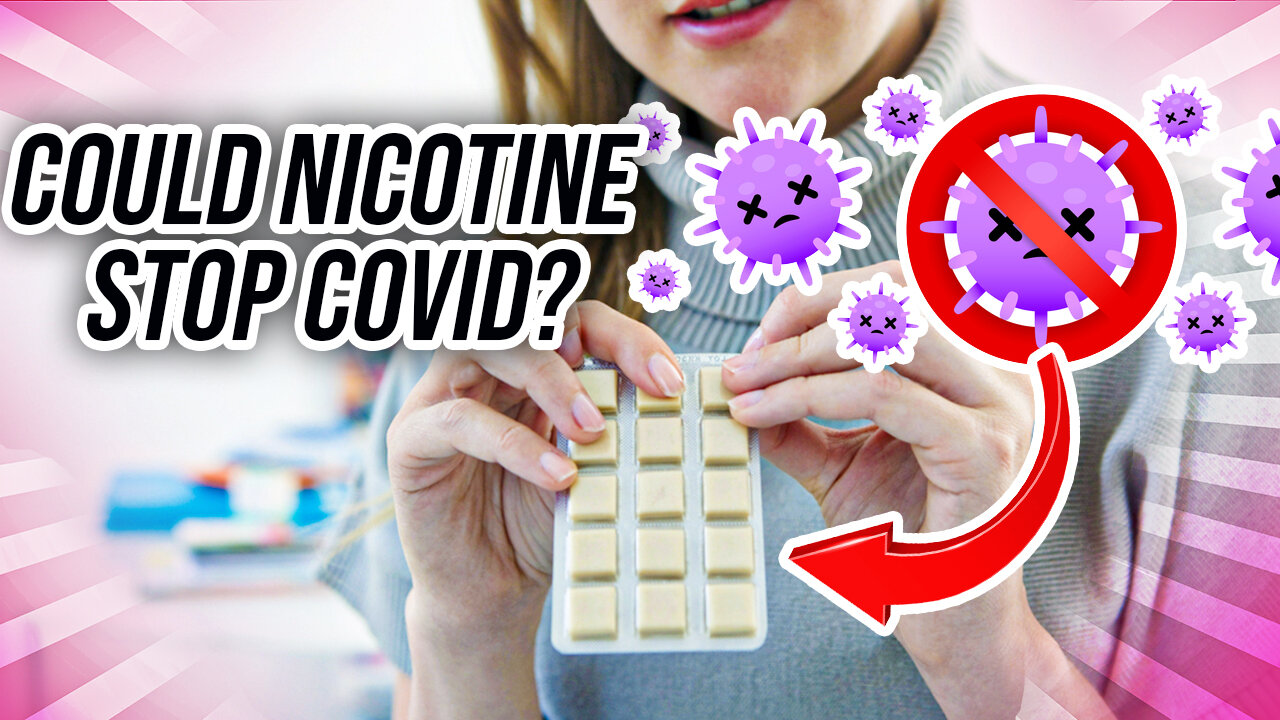Premium Only Content

Could Nicotine Stop Covid?
This is the video to accompany an OpEd I wrote for TrialSiteNews.com. The article is available here: https://trialsitenews.com/could-tucker-carlsons-nicotine-gum-habit-stop-covid/
ALL REFERENCES & HYPERLINKS IN THE ORIGINAL ARTICLE AT TrialSiteNews.com
Could Tucker Carlson's Nicotine Gum Habit Stop Covid?
by Dr. Cameron Jones, Ph.D.
Tucker Carlson of Fox News fame is not a cigarette smoker but is known to chew nicotine gum throughout the day. He once told Gavin McInnes, the far-right political commentator that he spends $300 per week on the gum saying it provides "a deep sense of satisfaction" and "it forms the basis of your joy". Tucker also claims "it cures unhappiness" while insiders say he only stops chewing to film segments for his show. However more recent reports claim he has given up the nicotine chews after 36 years.
Could it be time for Tucker to take up the habit again?
Early in the pandemic researchers were scrambling to make sense of the data, much of this from China which has a high smoking prevalence. One review showed that current smokers were less likely to have an adverse COVID-19 outcome compared with former smokers. A groundbreaking pre-print from France in mid-2020 then examined if nicotine replacement therapy (NRT) given to smokers split into two groups (those with and without major smoking-related disease) would have an effect on hospitalization with COVID-19. In people without comorbidities from smoking-related diseases, nicotine replacement therapy was associated with a decreased risk of hospitalization. The ratio of NRT versus no NRT for patients hospitalized with COVID-19 was 151:496 while the ratio of death or intubation was 13:73. However, these trends did not carry over for patients having known smoking-related diseases.
Continuing research then suggested that nicotine, not smoking, could offer some protection against COVID-19. There are even five clinical trials underway at the Hôpitaux de Paris,,, and at the Central Hospital, Nancy, France. They are investigating the potential protective effect of nicotine patches to prevent adverse outcomes like the need for mechanical ventilation or transfer to intensive care and even as a preventative. According to ClinicalTRials.gov these studies are active or recruiting or show as complete, but as yet, no new results have been published.
Since the coronavirus pandemic began, doctors and scientists have observed that daily active cigarette smokers are less likely to become severely infected or hospitalized despite the fact the virus targets the lungs. Reformed puffers aren't so lucky and are more likely to become ill due to smoke-damaged respiratory or cardiovascular systems, or because of immune compromise. Ultimately, COVID-19 is an inflammatory syndrome illness.
Current thinking is that the principal receptor allowing the SARS-CoV-2 virus to infect cells is through the angiotensin-converting enzyme 2 (ACE2) found in the lungs, small intestine, colon, kidney, brain, and heart. However, there is some doubt this is the only way the virus causes infection since high ACE2 levels may be beneficial rather than harmful, especially in people with lung injury, like smokers.
When lungs are infected by bacteria, fungi or viruses a strong inflammatory response occurs. Illness severity depends on lung macrophages which switch between pro-inflammatory and anti-inflammatory modes by releasing high levels of inflammatory cytokines. This signals other cells to challenge the infection and helps with healing. Severe COVID-19 symptoms and mortality are related to an over-responsive immune system leading to the cytokine storm effect.
What if other receptors or activators control whether the coronavirus can successfully gain entry into cells?
This paradox is explained by the nicotine hypothesis where the addition of this alkyloid drug exerts its protective effect via the nicotinic acetylcholine receptor (nAChR) by modulating ACE2 expression and preventing a hyperinflammatory response. By increasing ACE2 expression in cells, lung injury and kidney damage can be limited. Nicotine may also help reduce platelet aggregation and stop clot formation since it has known antioxidant and anti-inflammatory properties.
Even though pharmaceutical nicotine products are intended as smoking substitutes, their safety in non-smokers has been established. For example, nicotine replacement therapy has been used to treat multiple sclerosis, attention-deficit hyperactivity disorder (ADHD), Tourette syndrome, Parkinson's disease, Alzheimer's, arthritis, and ulcerative colitis.
I reached out to Professor Bertrand Dautzenberg who reviewed the design of the French nicotine clinical trials for comment. He confirmed that although transdermal nicotine is being tested as a preventative against COVID-19 for up to 82 days it is "not in general practice and only in the prospective randomized trial" where they're watching for outcomes.
The next part of the trial looked at treating patients already in the hospital for the duration of their stay (7-35 days). Dautzenberg commented that "because of vaccination, the accrual of patients dramatically dropped a few weeks after initiation, and we had to stop the trial".
So, what about the potential of nicotine treatment of patients in intensive care (up to 30 days) which was another component of the latest trial?
The good news from Professor Dautzenberg is that "the study is closed with the expected number of patients" and "we are cleaning the database and we plan to have results at the end of 2021".
Although no published clinical results are available at this time to supplement the earlier work, a review of over forty international studies shows clear differences between smoking history and non-severe and severe COVID illness; with smokers being more than twice as likely to suffer severe illness. But there are numerous contradictory studies from China, South Korea, and India showing protection from SARS-CoV-2 infection from smoking.
I asked Professor Dautzenberg about the importance of therapeutics like nicotine compared with vaccines and their role in public health messaging. He is of the view that the "vaccine is much more active but it's important to understand everything about COVID-19 including the interaction of nicotine with COVID".
So even though we'll have to wait for the results from these trials, we all want to know whether nicotine might work as a preventative or to limit hospitalization or severity.
To this, Prof. Dautzenberg commented "the only practical recommendation is to offer complete nicotine substitution in all hospitalized COVID" patients.
I also reached out to Dr. Joe Kosterich, Chairman of the Australian Tobacco Harm Reduction Association (ATHRA) for comment but he was “not in a position to comment on the issues” since “the focus of ATHRA is tobacco harm reduction and use of alternate nicotine delivery systems to assist smokers to quit combustible tobacco”.
Based on the scientific research alone, repurposing already available and approved nicotine products like gum or patches could help restore the compromised function of the nicotinic cholinergic system under coronavirus attack. This could be a valuable, low-cost therapeutic option for treating COVID-19 by reducing inflammation and suppressing the cytokine storm.
Whether it’s lockdowns or mandates or infection itself, COVID-19 had undeniably altered the life plans for many of us. Even though it’s been said that not every disease is also an illness, quality of life is strongly linked with health and happiness. Philosophers call this beneficence in healthcare and is where medical interventions are meant to benefit the patient. At the same time, there’s a moral and ethical requirement for the patient to understand the risks and benefits before making an independent decision.
As this pandemic evolves and we all look for our own personal protections against the virus, perhaps the final word fittingly is had by Tucker Carlson who said about nicotine, “the question really is – are you ready to be happy?”
-
 LIVE
LIVE
SpartakusLIVE
2 hours agoNONSTOP Snipes, Rockets, and BICEPS = Monday MOTIVATION
269 watching -
 LIVE
LIVE
JakRazGaming
2 hours agoPlaying Minecraft with GameQuest1552, Rexmon, and JuicyKinnKandy! Stream 16
47 watching -
 24:02
24:02
The Quiet Part
3 hours agoOur Court Failed Us - In The Name of Tolerance
6.55K5 -
 LIVE
LIVE
LFA TV
22 hours agoLFA TV ALL DAY STREAM - MONDAY 9/8/25
794 watching -
 1:01:36
1:01:36
BonginoReport
4 hours agoNationwide Crime Spree Amid Trump Crackdown (Ep. 129) - Nightly Scroll with Hayley 09/08/2025
55K31 -
 36:23
36:23
MattMorseTV
2 hours ago🔴Pritzker just GOBBLED UP Trump's BAIT.🔴
3.16K17 -
 11:52
11:52
TundraTactical
3 hours agoThIs Is The Most Dangerous Push For Gun Control You've Never Heard Of
971 -
 59:53
59:53
Donald Trump Jr.
3 hours agoProtecting Home Field: Cartels on Notice, Plus Biden Autopen Scandal Goes From Bad to Worse | Triggered Ep.273
48.3K62 -
 1:01:40
1:01:40
The Nick DiPaolo Show Channel
6 hours agoMedia Ignores Slaughter of White Woman | The Nick Di Paolo Show #1789
38.8K26 -
 LIVE
LIVE
Rallied
3 hours ago $0.58 earnedSolo Challenges All Day
81 watching